2023 Top 10 Global CSR Events
2024-01-16GoldenBee责任编辑0
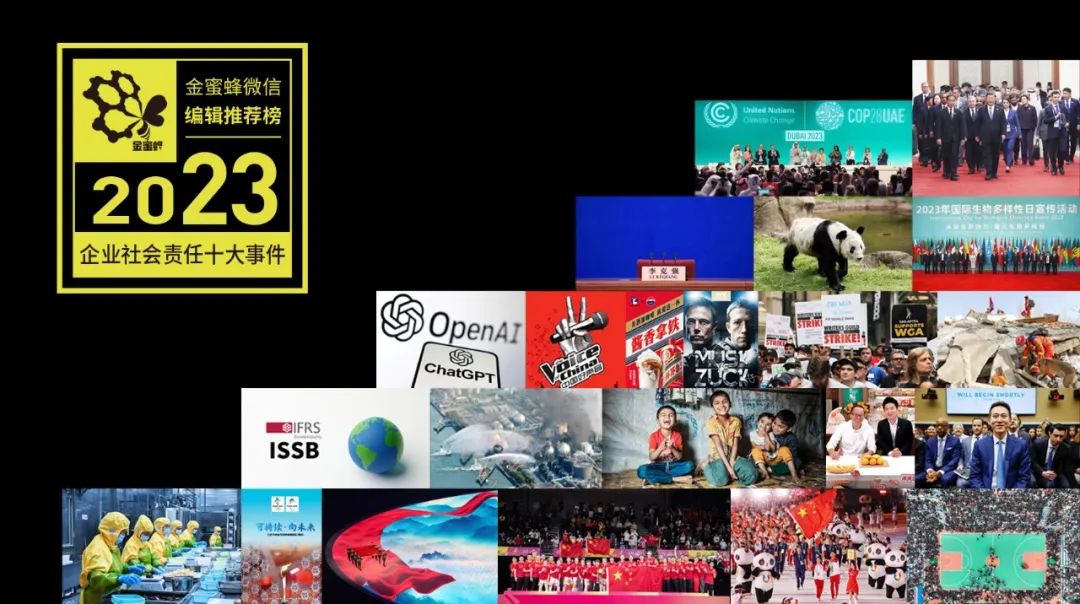
The year of 2023 marked the midpoint of the 2030 Agenda for Sustainable Development.
However, just 7 years remain to achieve the Sustainable Development Goals (SDGs) by 2030. However, global development is still undergoing profound shifts. The intensified climate change, ongoing regional conflicts, and the rise of artificial intelligence etc. paint a complex picture: a tapestry of interdependence, tension, and opportunity woven against the backdrop of unprecedented global change.
The Sustainable Development Goals Report 2023 therefore warns of the possibility of escalating political instability, disrupting the economy, and causing irreversible environmental damage if global efforts are not doubled to achieve SDGs.
In 2023, we also saw breakthrough potential in many fields.
A global surge in clean energy investment, continuous technological breakthroughs in artificial intelligence (AI) and the Internet of Things (IOT), and growing popularity of ESG and cultural exchange showcase a convergence of resources, knowledge, and technology in a more efficient and coordinated manner. Collaborative international mechanisms are enabling nations to co-create innovative solutions and collectively advance the 2030 Agenda for Sustainable Development.
Since 2006, the China Sustainability Tribune has been selecting and publishing the annual list of top 10 CSR events for 18 years. As the first step in 2024, it selected the 2023 top 10 global CSR events (in chronological order) to review and solute all efforts in social responsibility development and welcome a better sustainable world.
The top 10 global CSR events, brimming with boundless possibilities, offer a broader perspective on solving global development challenges and stand as a testament to the world's collective efforts to build a better tomorrow.
01 EU published proposed legislation to extend the EU ETS to the shipping sector
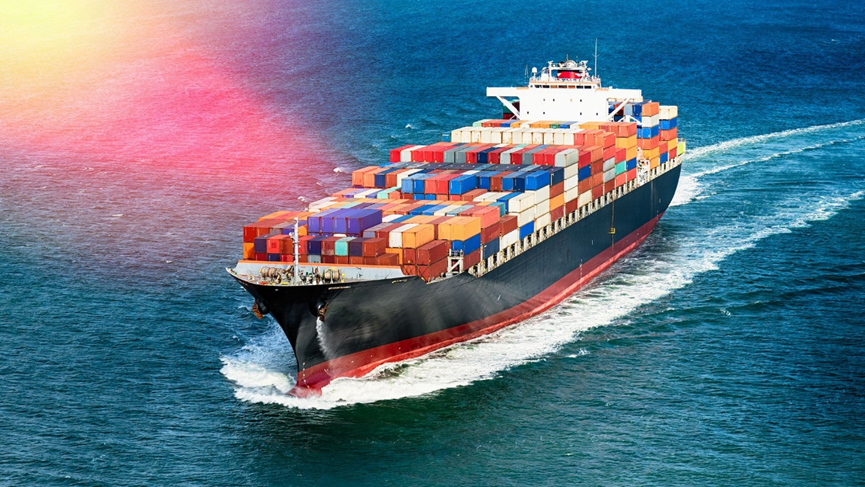
On June 5, a new EU legislation entered into force which extended the scope of the EU Emission Trading System (EU ETS) to maritime transport. It means that for shipping companies performing voyages arriving at, within or departing from ports under the jurisdiction of an EU member state, they will need to purchase allowance for GHG such as CO2 emitted from specific ships.
The new legislation establish a three-phase approach for mandatory emission allowance for shipping companies: 40% in 2024, 70% in 2025 and 100% by 2026.
Reason for selection:
Green transformation is the defining trend for shipping companies. By including the shipping industry in EU ETS, the EU has taken a leading role in limiting and gradually tightening the total carbon emissions of the sector under its jurisdiction. It is a strong signal for companies to accelerate the decarbonization and green transformation. It is foreseeable that in the future, the shipping industry will face stricter regulatory oversight and higher GHG emissions costs. Therefore, shipping companies and export companies need to proactively take green actions, improve energy efficiency management and elevate operational levels to seize the opportunity in global competition.
02 ISSB issued its first two IFRS Sustainability Disclosure Standards
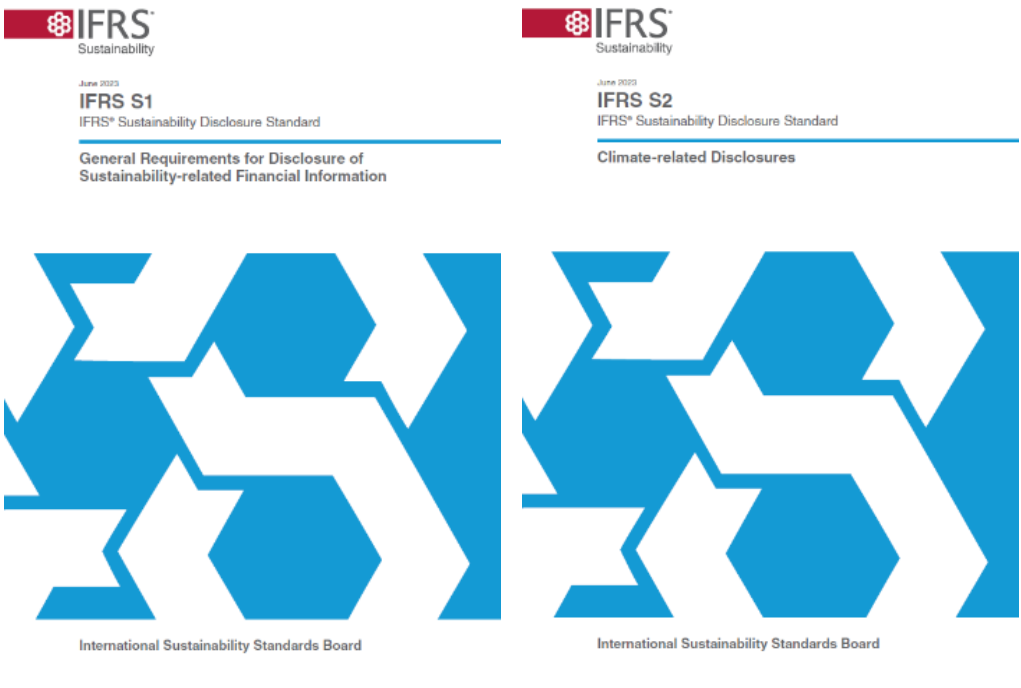
On June 26, 2023, the International Sustainability Standards Board (ISSB) issued its inaugural sustainability reporting standards—IFRS S1 General Requirements for Disclosure of Sustainability-related Financial Information (IFRS S1) and IFRS S2 Climate-related Disclosures (IFRS S2) (together, the ISSB Standards). The ISSB Standards are designed to ensure that companies provide sustainability-related information alongside financial statements—in the same reporting package. The Standards are effective for annual reporting periods after 1 January 2024 with earlier application permitted.
Reason for selection:
Establishing a uniformed disclosure standard for sustainability-related issues is a key initiative to support the formation of the ISSB. As a global benchmark, ISSB Standards would promote to establish a consistent, comparable, and reliable framework for sustainability-related standards. This, in turn, would encourage companies to improve their management of sustainability-related risks and opportunities, leading to high-quality information disclosure. Ultimately, this framework can bridge the gap between capital markets and investors, fostering greater transparency and trust in the capital market's operations.
03 Joint Action Initiative on Fulling Corporate Social Responsibilities by Chinese Companies in Africa launched

On June 30, during the Corporate Social Responsibility and China-Africa Cooperation Summit Dialogue hosted by Alliance of Chinese Business in Africa for social Responsibilities (ACBASR), a Joint Action Initiative on Fulling Corporate Social Responsibilities by Chinese Companies in Africa was commenced. The Initiative calls for companies in Africa actively practice mission, deliver efforts into African development, and draw Africa blueprint for sustainable development with African people and international parties. The "100 Enterprises and 1000 Villages" programs undertaken by the ACBASR also plans to mobilize at least 100 Chinese enterprises in Africa to actively fulfill their social responsibilities in Africa within three years.
Reason for selection:
Many Chinese companies operating in Africa are playing a crucial role in the China-Africa partnership. Guided by principles of extensive consultation, joint construction, and shared benefits, as well as the correct concept of justice and interest, they're working together with local communities to solve challenges like infrastructure gaps and skills shortages. These companies are demonstrating exemplary corporate responsibility through numerous well-designed projects. This initiative highlights their collaborative approach, their deep integration into local development, and their tangible contributions to people's lives. This showcases the warmth, trust, and responsibility that define Chinese companies in Africa.
04 European Sustainability Reporting Standards released
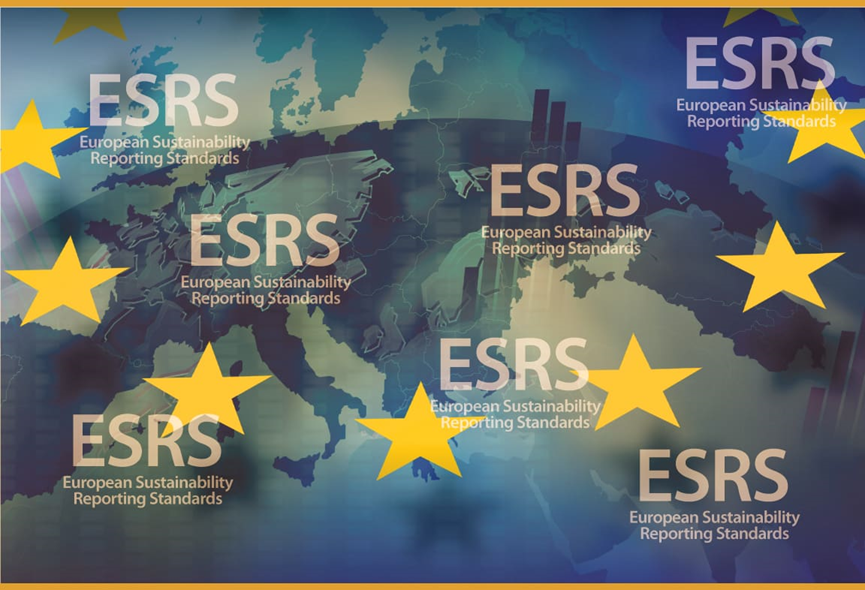
On July 31, 2023, the European Commission adopted the first set of 12 European Sustainability Reporting Standards (ESRS). The ESRS are the rules and requirements for companies to report on sustainability-related impacts, opportunities and risks under the Corporate Sustainable Reporting Directive (CSRD). The ESRS cover the full range of environmental, social, and governance issues, including climate change, biodiversity and human rights.
Reason for selection:
The EU has long focused on the legislation and policy planning related to sustainability-related standards. The launch of the ESRS standards further proves its ambition and commitment. These clear guidelines, building on the CSRD, pave the way for comprehensive and reliable sustainability reporting by a wide range of companies within the EU. This mandatory disclosure will not only improve individual companies' information quality and sustainable management practices, but also send ripples through supply chains.
05 Half of SDGs show moderate or severe deviations from the desired trajectory, UN reports

On July 10, 2023, the 2023 Sustainable Development Goals Report: Special Edition, released by the United Nations, reveals that of the approximately 140 targets that can be evaluated, half of them show moderate or severe deviations from the desired trajectory, and more than 30 percent of these targets have experienced no progress or, even worse, regression below the 2015 baseline.
Reason for selection:
The report provides a comprehensive midpoint assessment of the 2030 Agenda. While the existing gaps, the report also emphasizes the immense potential for success through strong political will and the utilization of available technologies, resources, and knowledge. Companies can contribute to areas where urgent actions are needed, particularly in scaling up investments in SDGs. The report also provides a vision of hope by showcasing the progress the world has made so far and the potential for further advancements.
06 BRI crucial in supercharging implementation of SDGs, Secretary-General tells forum

On October 18, UN Secretary-General António Guterres addressed at the Third Belt and Road Forum for International Cooperation 2023 in Beijing. He outlined that “Together, with the contributions of the Belt and Road Initiative, we can turn the infrastructure emergency into an infrastructure opportunity, supercharge the implementation of the Sustainable Development Goals, and deliver hope and progress for billions of people and the planet we share”.
He also emphasized that the Belt and Road Initiative has included nearly USD 1 trillion in cumulative investments across more than 3,000 projects around the world.
Reason for selection:
The year of 2023 marks the 10th anniversary of the Belt and Road Initiative. Over the past 10 years, the initiative has made contributions to improving people's well-being across the world. Now, the Belt and Road demonstrates that we have a historic opportunity to build modern, green cities, communities, and transportation and power systems that place resilience and sustainability at the heart. That deliver services and decent jobs for people in a sustainable manner.
07 COP28: 50 oil and gas companies sign net zero, methane pledges

A total of 50 oil and gas companies representing more than 40 percent of global oil production have joined the Oil and Gas Decarbonization Charter (OGDC), which is aimed at achieving global energy transition goals across the oil and gas sectors, at the COP28 climate summit in the United Arab Emirates.
National oil companies (NOCs) represent over 60 percent of the signatories to the charter, which is the largest-ever number of NOCs committing to a decarbonization initiative. The charter signatories have committed to net-zero operations by 2050 at the latest, ending routine flaring by 2030, and near-zero upstream methane emissions, and increasing alignment with broader industry best practices to accelerate decarbonization of operations.
Reason for selection:
COP28 concluded with a historic agreement named The UAE Consensus to deliver a new era of climate action. It calls on Parties to transition away from fossil fuels to reach net zero. The Oil and Gas Decarbonization Charter reflects the proactive engagement and transition of the oil and gas industry in the global effort to reduce emissions. All Parties agreed upon a clear roadmap to accelerate progress through a pragmatic global energy transition and a “leave no one behind” approach to inclusive climate action.
08 EU new rules to regulate AI
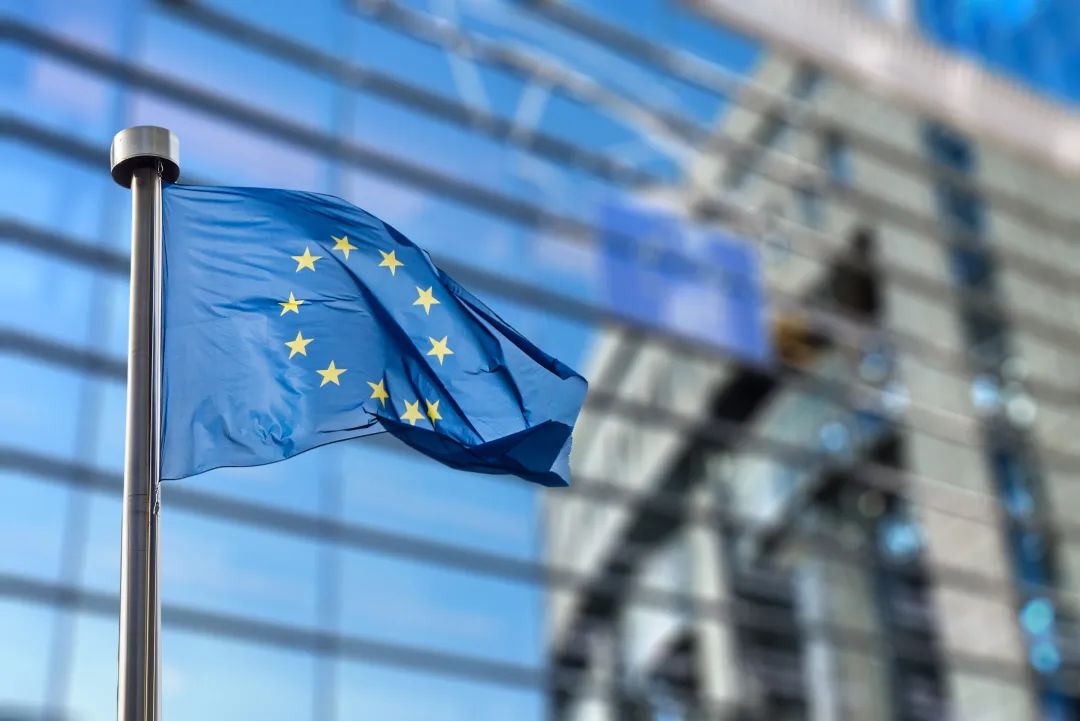
On December 8, the Commission, Parliament and the Council of the European Union reached an agreement on the EU AI Act. This legislation marks the first-ever dedicated law on artificial intelligence.
The flagship legislation proposes a risk-based regulatory framework on artificial intelligence. Systems containing deemed unacceptable risks, including cognitive manipulation, predictive policing, emotion recognition in workplaces and schools, social scoring, and certain remote biometric identification systems, will be banned, with limited exceptions. AI companies would be required to maintain human control over their algorithms, provide technical documentation and have a risk-management system for "high-risk" applications.
Reason for selection:
As AI development is outpacing technology regulation, legal ethics, and policy assessment, there is an urgent need for more visionary top-level design and planning. As a comprehensive EU regulation, the EU AI Act will help strengthen global AI governance and directly exert a huge impact on AI research and development, as well as design and operation of products and services.
09 ISO publishes carbon neutrality standard: ISO 14068-1

As reported on December 12, recently, the International Organization for Standardization (ISO) has released the first part of their ISO 14068 series, ISO 14068-1: Carbon Neutrality.
The standard provides a framework for achieving and demonstrating carbon neutrality. It includes requirements for carbon neutrality commitments and making carbon neutrality claims. It calls for the engagement of business leaders in carbon neutrality management and reporting in each reporting period, and specifies the detailed requirements for carbon neutrality reporting.
Reason for selection:
ISO 14068-1:2023 is a complete and systematic international standard on carbon-related issues. It is designed to the goal of carbon management, that is, carbon neutrality. It reflects the organic combination between traditional management systems and a pioneering concept of carbon management. This will provide companies with unified approaches and principles to achieve carbon neutrality and support better use of targets and descriptions regarding carbon neutrality for organizations and products.
10 Spring Festival listed as a UN floating holiday

The 78th United Nations General Assembly passed a resolution on Friday, officially designating the Lunar New Year, as a UN floating holiday.
The official recognition of the Chinese New Year as a UN holiday fully showcases the influential power of Chinese civilization, which will promote exchanges and mutual learning among diverse world cultures and actively embody the UN's values of diverse and inclusive cultural ideals.
Reason for selection:
The Spring Festival, as a traditional Chinese holiday featuring family reunion and good wishes for the coming year, not only bears the ideas of the Chinese civilization of peace and harmony but also carries the common values of humanity such as harmonious family, social inclusion and sound relationship between man and nature. This decision not only indicates an increasing global recognition of and respect for Chinese culture, but also reflects the active promotion of global cultural diversity. It provides a broader platform for cultural exchanges and communication around the world.
About the “2023 Top 10 Global CSR Events”
As an annual record of the CSR policies and practices, China Sustainability Tribune has been selecting and publishing the annual list of top ten CSR events for 18 years since 2006.
In order to ensure a more comprehensive, accurate, open and transparent selection, we seek opinions from external experts from governments, companies, universities and research institutions in the field of CSR to ensure the professionalism, authority and transparency.
· Guo Xiuming, former Associate Counsel, Department of Policies, Laws and Regulations, Ministry of Industry and Information Technology
· Xia Guang, Deputy Head of All-China Environment Federation
· Lei Hong, former Vice President of Chinese Sociological Society, Dean of HUST-GoldenBee CSR Research Institute
· Chen Yuanqiao, Researcher at China National Institute of Standardization
· Cheng Duosheng, former Director of Innovation Working Department of Chinese Enterprises Federation
· Liang Xiaohui, Chief Researcher of Social Responsibility Office, China National Textile and Apparel Council
· Qian Xiaojun, Professor, Associate Dean of Academics at Schwarzman College, Director of Research Center for Green Economy and Sustainable Development, Tsinghua University
· Xue Dayuan, Professor and Doctoral Supervisor of Minzu University of China
· Li Li, Professor of the University of International Business and Economics, Expert of the Beijing 2022 Winter Olympics Sustainability Advisory Committee
· Guo Yi, Professor of School of Economics, and Director of Business Environment Research Center, Beijing Technology and Business University (BTBU)
· Zhang Jiutian, Executive Director of Green Development Institute at Beijing Normal University
· Yu Zhihong, President and Editor-in-Chief of China Sustainability Tribune
· Yin Gefei, Chief Expert of GoldenBee Thinktank
· Guan Zhusun, Executive Dean of HUST-GoldenBee CSR Research Institute
Thanks to experts who participated in the selection of “2023 Top 10 Global CSR Events”.
Best Practices
- The 100-year brand — Air Liquide also has a sense of juvenile
- Beijing Public Transportation Corporation: Developing green transportation to build a harmonious and livable capital
- CGN: Building a modern factory in barren deserts and developing a new win-win cooperation model along “Belt and Road”
Upcoming Event

All the materials on the site “Source: XXX (not from this site)” have been reprinted from other media. They do not imply the agreement by the site.
All the materials with “Source: CSR-China Website” are the copyright of CSR-China Website. None of them may be used in any form or by any means without permission from CSR-China Website.
GoldenBee Official WeChat
Copyright © Csr-china.net All Right Reserved.
京ICP备19010813号










